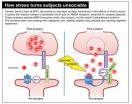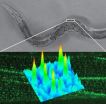(Press-News.org) Why is it that when people are too stressed they are often grouchy, grumpy, nasty, distracted or forgetful? Researchers from the Brain Mind Institute (BMI) at EPFL have just highlighted a fundamental synaptic mechanism that explains the relationship between chronic stress and the loss of social skills and cognitive impairment. When triggered by stress, an enzyme attacks a synaptic regulatory molecule in the brain. This was revealed by a work published in Nature Communications.
Carmen Sandi's team went to look for answers in a region of the hippocampus known for its involvement in behavior and cognitive skills. In there, scientists were interested in a molecule, the nectin-3 cell adhesion protein, whose role is to ensure adherence, at the synaptic level, between two neurons. Positioned in the postsynaptic part, these proteins bind to the molecules of the presynaptic portion, thus ensuring the synaptic function. However, the researchers found that on rat models affected by chronic stress, nectin-3 molecules were significantly reduced in number.
The investigations conducted by the researchers led them to an enzyme involved in the process of protein degradation: MMP-9. It was already known that chronic stress causes a massive release of glutamate, a molecule that acts on NMDA receptors, which are essential for synaptic plasticity and thus for memory. What these researchers found now is that these receptors activated the MMP-9 enzymes which, like scissors, literally cut the nectin-3 cell adhesion proteins. "When this happens, nectin-3 becomes unable to perform its role as a modulator of synaptic plasticity" explained Carmen Sandi. In turn, these effects lead subjects to lose their sociability, avoid interactions with their peers and have impaired memory or understanding.
The researchers, in conjunction with Polish neuroscientists, were able to confirm this mechanism in rodents both in vitro and in vivo. By means of external treatments that either activated nectin-3 or inhibited MMP-9, they showed that stressed subjectscould regain their sociability and normal cognitive skills. "The identification of this mechanism is important because it suggests potential treatments for neuropsychiatric disorders related to chronic stress, particularly depression," said Carmen Sandi, member of the NCCR-Synapsy, which studies the neurobiological roots of psychiatric disorders.
Interestingly, MMP-9 expression is also involved in other pathologies, such as neurodegenerative diseases, including ALS or epilepsy. "This result opens new research avenues on the still unknown consequences of chronic stress," concluded Carmen Sandi, the BMI's director.
INFORMATION:
How stress tears us apart
A team from the EPFL Brain Mind Institute has discovered an important synaptic mechanism: the activation of a cleaving enzyme, leading to behavioral problems connected to chronic stress.
2014-09-18
ELSE PRESS RELEASES FROM THIS DATE:
Scientists pioneer microscopy technique that yields fresh data on muscular dystrophy
2014-09-18
Scientists at USC have developed a new microscopy technology that allows them to view single molecules in living animals at higher-than-ever resolution.
Dubbed "Complementation Activated Light Microscopy" (CALM), the new technology allows imaging resolutions that are an order of magnitude finer than conventional optical microscopy, providing new insights into the behavior of biomolecules at the nanometer scale.
In a paper published on Sept. 18 by Nature Communications, the researchers behind CALM used it to study dystrophin – a key structural protein of muscle cells ...
In mice, vaccine stops urinary tract infections linked to catheters
2014-09-18
The most common type of hospital-associated infection may be preventable with a vaccine, new research in mice suggests.
The experimental vaccine, developed by researchers at Washington University School of Medicine in St. Louis, prevented urinary tract infections associated with catheters, the tubes used in hospitals and other care facilities to drain urine from a patient's bladder.
Each day a catheter is present in the urethra and the bladder, the risk of urinary tract infection increases. Nearly every patient who has a catheter for more than 30 days acquires a urinary ...
Migraine in middle age linked to increased risk of Parkinson's, movement disorders later
2014-09-17
MINNEAPOLIS – A new study suggests that people who experience migraine in middle age may be more likely to develop Parkinson's disease, or other movement disorders later in life. Those who have migraine with aura may be at double the risk of developing Parkinson's, according to the study published in the September 17, 2014, online issue of Neurology®, the medical journal of the American Academy of Neurology.
"Migraine is the most common brain disorder in both men and women," said study author Ann I. Scher, PhD, with Uniformed Services University in Bethesda, MD, and ...
For some lung cancer patients, surgery may yield better long-term results
2014-09-17
(September 17, 2014, San Francisco) – Patients with early stage non-small cell lung cancer (NSCLC) who are otherwise healthy fare better over time if they undergo conventional surgery versus less-invasive radiosurgery to remove their cancer, according to a Yale study. The findings are scheduled to be presented at the 56th annual conference of the American Society for Radiation Oncology in San Francisco. (Abstract # 302; Comparative Effectiveness of Stereotactic Body Radiotherapy versus Surgery for Stage I Non-Small-Cell Lung Cancer.)
The study used Medicare billing records ...
Brain imaging research pinpoints neurobiological basis for key symptoms associated with post-traumatic stress disorder like listlessness and emotional detachment in trauma victims
2014-09-17
NEW YORK, NY, September 17, 2014 - In a novel brain-imaging study among trauma victims, researchers at NYU Langone Medical Center have linked an opioid receptor in the brain -- associated with emotions -- to a narrow cluster of trauma symptoms, including sadness, emotional detachment and listlessness. The study, published online today in the journal JAMA Psychiatry, holds important implications for targeted, personalized treatment of post-traumatic stress disorder, or PTSD, a psychiatric condition affecting more than 8 million Americans that can cause a wide range of debilitating ...
PTSD symptoms associated with increased food addiction
2014-09-17
Bottom Line: Symptoms of posttraumatic stress disorder (PTSD) were associated with increased food addiction, especially when individuals had more symptoms or the symptoms occurred earlier in life.
Authors: Susan M. Mason, Ph.D., of the University of Minnesota, Minneapolis, and colleagues.
Background: PTSD is a potentially severe psychiatric condition. A growing body of evidence suggests that PTSD is a risk factor for obesity and obesity-related diseases. Food addiction is not established as a psychiatric diagnosis but may indicate use of food to cope with psychological ...
Vitiligo treatment holds promise for restoring skin pigmentation
2014-09-17
VIDEO:
Henry Lim, M.D., chair of Dermatology, Henry Ford Hospital, highlights the study.
Click here for more information.
DETROIT – A treatment regimen is safe and effective for restoring skin pigmentation in vitiligo patients, according to a Henry Ford Hospital study.
"Our findings offer patients with vitiligo worldwide a renewed hope for a bright future in the treatment of this disfiguring disease," says Henry Lim, M.D., chair of Dermatology at Henry Ford and the study's ...
Combo of phototherapy, drug results in faster repigmentation in vitiligo
2014-09-17
Bottom Line: Patients with the skin depigmentation disease known as vitiligo had faster and better repigmentation after a combination therapy of the implantable drug afamelanotide and narrowband UV-B (NB-UV-B) phototherapy as part of a clinical trial.
Author: Henry W. Lim, M.D., of Henry Ford Hospital, Detroit, Mich., and colleagues.
Background: Vitiligo is characterized by white patches of skin and affects 1 percent to 2 percent of the population. The authors report the results of a multicenter randomized clinical trial comparing the safety and effectiveness of the ...
Chromosome buffers hold key to better melanoma understanding
2014-09-17
Buffers that guard against damage to the ends of chromosomes could hold the key to a better understanding of malignant melanoma – the deadliest form of skin cancer – according to new research from the University of Leeds.
The study has uncovered an important new genetic risk factor for melanoma.
It is well known that pigmentation and mole count are the strongest indicators of those most at risk of developing melanoma. For example, paler people should take more care in the sun, as they burn more easily.
It now appears that another risk factor is the length of telomeres, ...
NASA sees Tropical Storm Polo intensifying
2014-09-17
Tropical storm warnings now issued for a portion of the Southwestern coast of Mexico as Polo continues to strengthen. Infrared imagery from NASA's Aqua satellite showed powerful thunderstorms around the center of the storm.
A Tropical Storm Warning is in force for the southwest coast of Mexico from Punta San Telmo to Playa Perula. A Tropical Storm Watch is in force from Punta San Telmo to Zihuatanejo and from Playa Perula to Cabo Corrientes. Rainfall totals of 5 to 10, locally up to 15 inches, can be expected over coastal areas of Michoacan, Colima and Jalisco states ...
LAST 30 PRESS RELEASES:
A kaleidoscope of cosmic collisions: the new catalogue of gravitational signals from LIGO, Virgo and KAGRA
New catalog more than doubles the number of gravitational-wave detections made by LIGO, Virgo, and KAGRA observatories
Antifibrotic drug shows promise for premature ovarian insufficiency
Altered copper metabolism is a crucial factor in inflammatory bone diseases
Real-time imaging of microplastics in the body improves understanding of health risks
Reconstructing the world’s ant diversity in 3D
UMD entomologist helps bring the world’s ant diversity to life in 3D imagery
ESA’s Mars orbiters watch solar superstorm hit the Red Planet
The secret lives of catalysts: How microscopic networks power reactions
Molecular ‘catapult’ fires electrons at the limits of physics
Researcher finds evidence supporting sucrose can help manage painful procedures in infants
New study identifies key factors supporting indigenous well-being
Bureaucracy Index 2026: Business sector hit hardest
ECMWF’s portable global forecasting model OpenIFS now available for all
Yale study challenges notion that aging means decline, finds many older adults improve over time
Korean researchers enable early detection of brain disorders with a single drop of saliva!
Swipe right, but safer
Duke-NUS scientists identify more effective way to detect poultry viruses in live markets
Low-intensity treadmill exercise preconditioning mitigates post-stroke injury in mouse models
How moss helped solve a grave-robbing mystery
How much sleep do teens get? Six-seven hours.
Patients regain weight rapidly after stopping weight loss drugs – but still keep off a quarter of weight lost
GLP-1 diabetes drugs linked to reduced risk of addiction and substance-related death
Councils face industry legal threats for campaigns warning against wood burning stoves
GLP-1 medications get at the heart of addiction: study
Global trauma study highlights shared learning as interest in whole blood resurges
Almost a third of Gen Z men agree a wife should obey her husband
Trapping light on thermal photodetectors shatters speed records
New review highlights the future of tubular solid oxide fuel cells for clean energy systems
Pig farm ammonia pollution may indirectly accelerate climate warming, new study finds
[Press-News.org] How stress tears us apartA team from the EPFL Brain Mind Institute has discovered an important synaptic mechanism: the activation of a cleaving enzyme, leading to behavioral problems connected to chronic stress.




